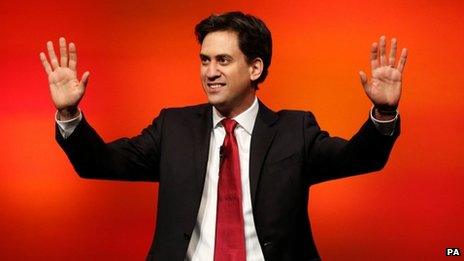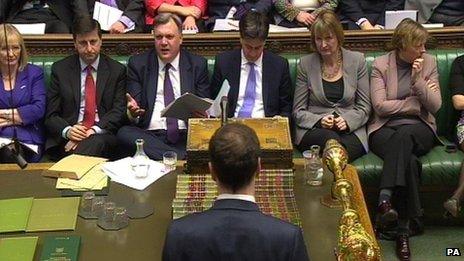Labour economic policies 'very clear' insists Harman
- Published

Labour's policy reviews will be reporting in the coming months
Labour has "momentum" on its side, deputy leader Harriet Harman has insisted, despite criticism of the party's response to the Budget.
Opinion polls suggest Labour's lead over the Tories is narrowing after George Osborne announced a surprise shake-up of pensions and savings.
MPs and campaigners have urged Ed Miliband to sharpen his message, with the general election 14 months away.
But Ms Harman said the party's economic arguments were "very clear".
Mr Miliband has been told by one of his MPs that he needs to be "much clearer" in setting out his own policies, including which coalition spending cuts he would reverse and which he would keep.
'Equal society'
Meanwhile, a group of Labour-supporting think tanks have warned the opposition not to rely on the "unpopularity" of the government to help it into power.
LabourList's Mark Ferguson calls on the party to roll out policies, warning the Conservative Party "has never been consistently hopeless for five years"
Polls for the Mail on Sunday and the Sunday Times suggest Labour's lead over the Conservatives has fallen to a single percentage point following George Osborne's Budget on Wednesday.
The chancellor promised to reform the pensions system to allow people more choice on how they spend their savings rather than buying annuities, which pay a regular income.
Although some Labour MPs have opposed the plan - or raised questions about its impact - the party has now said it will not reverse them if it wins power in 2015.
'Up and down'
Ms Harman said that while "polls obviously go up and down", the results of parliamentary and council elections since 2010 showed that the "momentum has very much been with us".
Labour, she insisted, had set out clear policies to tackle pressure on living standards, such as a proposed 20-month freeze in energy prices.
"I think Ed Miliband's message has been very clear. He has put the cost of living crisis on the political agenda.
"I think he has shown in relation to the energy companies... instead of just wringing his hands... that he understands the problem and is prepared to come forward with bold solutions where they are needed and he will continue to do that."
In a letter to the Guardian, external, a group of Labour-supporting organisations said the party's manifesto in 2015 should embody a "vision of a much more equal and sustainable society" that a "wider movement" of progressive opinion could rally around.
'Simple terms'
The signatories - including prominent figures from Compass, Progress, the Policy Network, Class, The Fabian Society and Labour List - said what was needed was not simply a change of government but a decisive break from existing policies on the economy, environment and public services.

Labour will not reverse planned changes to pensions and annuities
"The country needs not just a change of government but a transformative change in direction," they write.
"But if Labour plays the next election safe, hoping to win on the basis of Tory unpopularity, it will not have earned a mandate for such change."
There is concern that Labour is still being blamed for the size of the deficit and levels of immigration and its core economic message, based on the argument that most people are worse off than in 2010, could begin to lose its appeal as the recovery takes hold.
'Warning shot'
John Mann, MP for Bassetlaw in Nottinghamshire, said the latest polls were a "warning shot" to Labour, and reflected the fact the government's message on pension reform was "simple and popular".
"It would be naive to think otherwise, and the message is that we need to be much clearer and simpler in putting across what our alternative is and what we stand for," he told the BBC.
"We're trying to be too clever - too many nuanced messages to too many different people," he said - adding that Labour needed to talk "in simple, unambiguous terms".
Research by Survation for the Mail on Sunday, external suggests Labour support at 35%, up 1% on its rating in January. But Conservative support increased by 4% to 34%. The online survey of 1,000 adults was carried out on Thursday and Saturday.
Another poll, by YouGov for The Sunday Times,, external also suggested the Conservatives were a single point behind, on 36% to Labour's 37%. YouGov questioned 2,103 adults on Thursday and Friday.